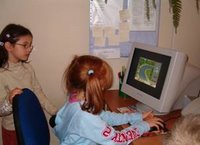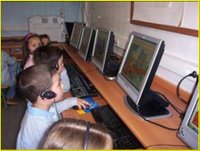Description LEoBS
LITLE EXPLORERS of BIG SPACE
/look-think- talk-imagine-realize/
Value:
Individual thinking in group work – building of self-esteem.
Aims:
Introducing the world of scientific inquiries and imagination to a child through a series of research games and simulations, problems solving.
Participants 5 - 6 year old children
Accessories:
Equipment of astronomical observatory and astro-physical classroom, things of everyday use, observation sheets, sheets of paper, writing and drawing accessories, etc.
Activity:
- carry out a series of observations In Astronomical Observatory
- carry out a series of research games – experiments, notes:
1) Close – far (magnifying glass, binoculars, telescope – tools used for observations) – how do they work?
2) Compass (magnetic phenomenon, attraction, repulsion, directions of movement, maps, observation posts) – how do I know it?
3) The Sun – The Earth (time, fixing time, passing of time – clocks, sun-dial in the garden, seasons of the year) – when?
4) Planets we can see – what do they look like, Tales of Mr. Astronomer – myths, star signs, crosswords, songs.
5) Explorations of the Space – making a model of the Solar System in the classroom, planetarium on an umbrella, a model of a spaceship – why?
6) Astronauts and aliens – a trip to astronomical observatory, museum or research institution (an astronaut’s spacesuit, a letter to the aliens, portraits, stories, “a language” of aliens, etc.) – use your imagination – what would happened if…?
Process of work:
- finding partners carrying out the project in different countries
- each partner handles one of the activities of the project in their nursery schools,
- keeps the record of the process and outcomes of the project,
- the exchange of the resources between the partners online (pictures, multimedia presentations, films, pictures, etc.)
- Publishing the outcomes on the project’s internet site.
The ouctoming resources :
- children will get to know tools for observations and rules of cooperation,
- children will develop imagination and will acquire skills such as: debating, expressing their own opinions, deciding, noticing connections between cause and effect, experiencing team work, making notes,
- children will collect material which they’ll later use in accomplishing the tasks, the outcomes of the project will be presented to the children’s parents and other children.
Evaluation:
- presentations of the children’s works, exhibitions of the outcomes, publishing them on the internet.
Individual thinking in group work – building of self-esteem.
Aims:
Introducing the world of scientific inquiries and imagination to a child through a series of research games and simulations, problems solving.
Participants 5 - 6 year old children
Accessories:
Equipment of astronomical observatory and astro-physical classroom, things of everyday use, observation sheets, sheets of paper, writing and drawing accessories, etc.
Activity:
- carry out a series of observations In Astronomical Observatory
- carry out a series of research games – experiments, notes:
1) Close – far (magnifying glass, binoculars, telescope – tools used for observations) – how do they work?
2) Compass (magnetic phenomenon, attraction, repulsion, directions of movement, maps, observation posts) – how do I know it?
3) The Sun – The Earth (time, fixing time, passing of time – clocks, sun-dial in the garden, seasons of the year) – when?
4) Planets we can see – what do they look like, Tales of Mr. Astronomer – myths, star signs, crosswords, songs.
5) Explorations of the Space – making a model of the Solar System in the classroom, planetarium on an umbrella, a model of a spaceship – why?
6) Astronauts and aliens – a trip to astronomical observatory, museum or research institution (an astronaut’s spacesuit, a letter to the aliens, portraits, stories, “a language” of aliens, etc.) – use your imagination – what would happened if…?
Process of work:
- finding partners carrying out the project in different countries
- each partner handles one of the activities of the project in their nursery schools,
- keeps the record of the process and outcomes of the project,
- the exchange of the resources between the partners online (pictures, multimedia presentations, films, pictures, etc.)
- Publishing the outcomes on the project’s internet site.
The ouctoming resources :
- children will get to know tools for observations and rules of cooperation,
- children will develop imagination and will acquire skills such as: debating, expressing their own opinions, deciding, noticing connections between cause and effect, experiencing team work, making notes,
- children will collect material which they’ll later use in accomplishing the tasks, the outcomes of the project will be presented to the children’s parents and other children.
Evaluation:
- presentations of the children’s works, exhibitions of the outcomes, publishing them on the internet.






